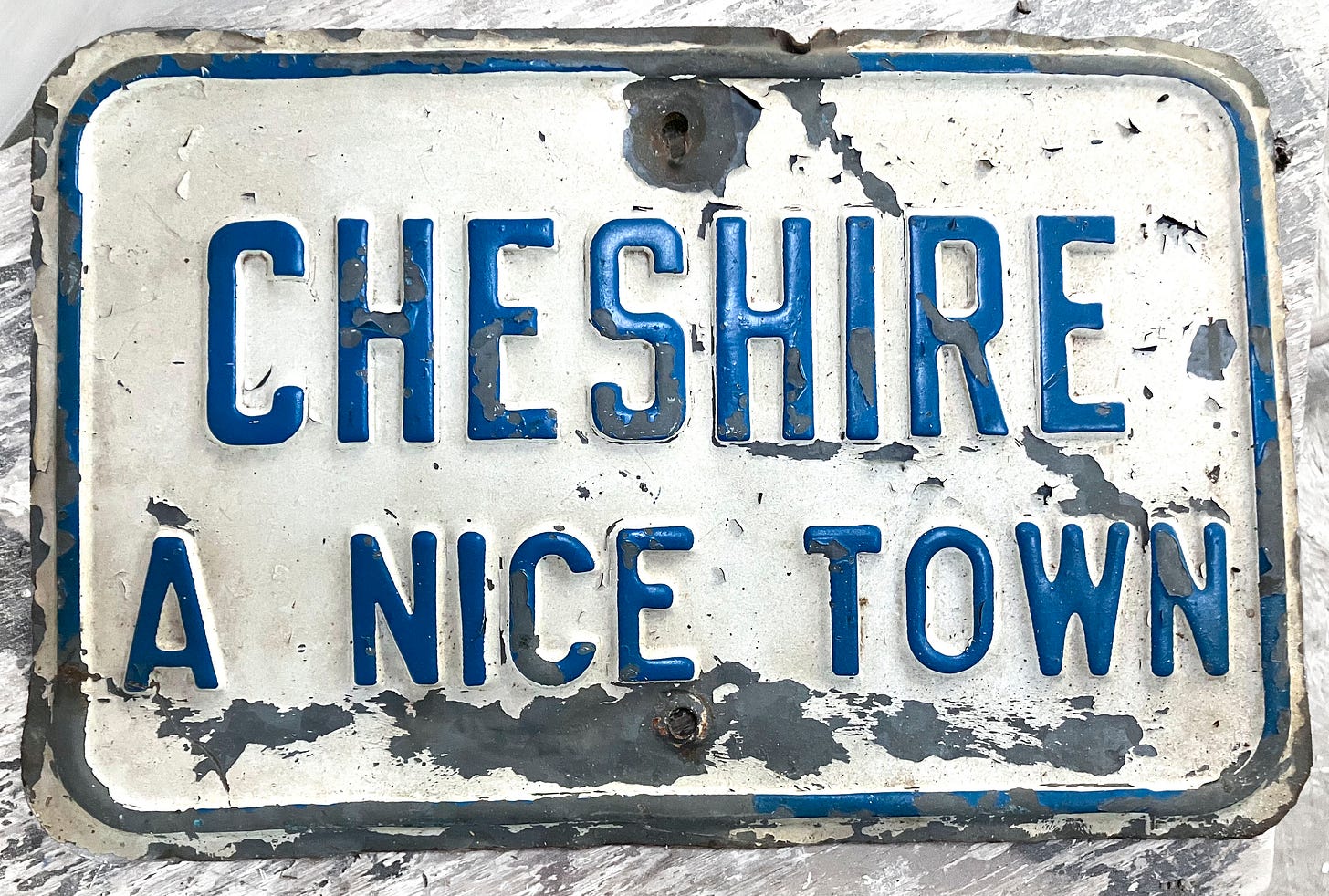
I’m going to start with a short history of what it was like growing up in my hometown, which is boring. Not much happens there: It’s still a “bedroom town”: a typical small, suburban town where residents commute to work in other towns and cities and return to sleep and eat. It’s a great place to raise a family, but a boring place to be a teenager, especially in the 1960s and early 1970s. Cheshire was located between Hartford (state capitol, best known for the Mark Twain House) and New Haven (Yale University, and the cultural capital of Connecticut), and sandwiched between cities like Meriden and Waterbury that were industrial centers in the 1800s and early 1900s. Yes, it was, and still is, a “nice town,” but… Enforcing “Nice” on everyone comes at a price.
New Haven is one of those cities where there was widespread censorship of alternative cultures, and supported by citizens. It was like the little brother to (Banned in) Boston.
For instance, on May 3, 1958, Alan Freed (“The Father of Rock ’N’ Roll”) hosted and managed a 17-act “Big Beat” show at the Boston Arena, which starrred several of the most popular rock ’n’ roll acts: Chuck Berry, Jerry Lee Lewis, Frankie Lymon, Danny & The Juniors and more. Five thousand fans packed the place, while just 20 police officers ran security. Once Jerry Lee Lewis (“The Killer,” aka “Rock ’n’ roll’s wild man”) started to play, kids started dancing in the aisles! This caused the police to stop the show and forced Alan Freed to encourage them to stop and sit down in their seats. The kids turned the arena into a dance club once again when Chuck Berry started his set, and the police again tried to force Alan Freed to stop them. Alan said: “It looks like the police in Boston don’t want you to have any fun.”
True, that.
At that point fights broke out in the crowd, who left the arena and spilled into the streets. It got crazy according to some reports, while other people claimed it was relatively quiet after the show. Although there were only a few arrests of concertgoers afterwards, the police blamed every act of violence that took place in the area on the rock ’n’ roll show: stabbings. shootings, robberies and rapes. A few days later Freed was arrested and soon was indicted on charges of starting a riot. Freed quit his popular WINS radio show after they refused to support him.
Eventually, the prosecutors on the case dropped the charges due to “lack of evidence,” but the damage was done. This was the beginning of the end for “The Father of Rock ’N’ Roll,” and for the first wave of rock music. Soon after Elvis Presley was drafted into the army, Freed was arrested on payola charges and the plane crash that killed Buddy Holly, Richie Valens and The Big Bopper happened.
As a result of the “Boston Rock ’N’ Roll Riot,” five cities in New England banned rock ’n’ roll shows: Boston MA, Newark NJ, Troy NY, New Britain CT and of course, New Haven, Connecticut.
LINK to the Alan Freed Website if you want more information about the Boston Rock ’N’ Roll Riot:
https://www.alanfreed.com/wp/archives/archives-rocknroll-1951-1959/boston-rio/
Then there was the Doors concert in New Haven on December 9, 1967. You know, when Jim Morrison was arrested on stage in the middle of a performance? It started backstage when Morrison was making out with a female fan in the shower. A local police officer (who didn’t know who Morrison was), told them to stop and leave the area.
Jim told the cop: “Eat it.”
The cop pulled out a can of Mace and warned: “Last chance.”
Jim replied: “Last chance to eat it.”
The policeman sprayed the Mace into his face.
The officer apologized to the band’s manager (since he attacked the singer of the band he was hired to protect), but of course it got worse. During the Doors’ “Back Door Man”, Morrison told the audience about the backstage incident, shouting “The whole fucking world hates me!” and calling the officer “a little blue pig.” Then he warned: "I'm just like you guys, man – he did it to me, they'll do it to you." The cops stopped the show and arrested Jim, which caused a small riot which ended up with 13 more arrests of concert-goers.
I saw a lot of shows in New Haven back in the day: Cream during their “Farewell Concert” at the New Haven Arena on October 11, 1968, Chuck Berry and Frank Zappa on a double-bill in 1972, but the best show I ever saw in Connecticut was at the New Haven Arena on April 28, 1972: Blue Oyster Cult (on their first tour) opened, the Edgar Winter Group (“Frankenstein” was a huge hit at the time) played next, and then Alice Cooper played their “Killer” show, where the climax featured Alice choping up a baby doll, kicking the dismembered head into the (crazed) audience, was sentenced to death by the rest of the band, and hung by a noose on a gallows. (Then he came back from the dead for a few more songs.) It was the best combination of theater and rock ‘n’ roll I have ever seen.
I became a fanatic and started buying Creem magazine every month, where I learned about this obscure music genre called “punk rock.” I became an instant punk rock fanatic, and bought records by punk rock bands like MC5, The Stooges, and later the New York Dolls.
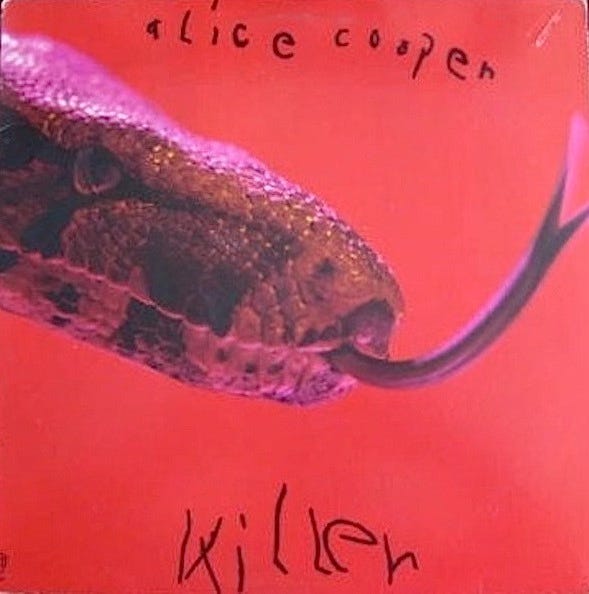
There was a better venue for music in nearby Wallingford: The Oakdale Theatre. It’s still open: For instance, an upcoming David Byrne concert is offering tickets from $186 to $1,146 apiece…
Hey! When did these shows become so expensive and who has the money for this kind of thing? Back in the day I got a front row center ticket for the Who on July 21, 1968 for (as I remember) $2.50! (I also saw Cream, my very first live rock concert, there a few weeks earlier but the seat sucked.) The Who concert changed my life! It was one of the wildest shows I have ever seen: At the end of the show I joined a bunch of people who ran onstage to grab whatever we could after they destroyed their instruments, managed to get a small piece of Townsend’s guitar and then got grabbed by a cop and thrown offstage!
A few months later, I produced an Apocalypse Players’ (my improv comedy group) show at the Cheshire High School auditorium that featured a production of Eugene Ionesco’s “The Lesson” (which features a professor who becomes impatient with a student and ends up murdering her, followed by a mash-up of Marx Brothers material (mostly taken from Duck Soup, one of the greatest anti-war films and funniest comedy movies ever).
Duck Soup preview:
We hadn’t rehearsed much so the performance was anything but smooth, but as usual we did a lot of slapstick gags: plenty of whipped cream pies and a lot of chaos. This offended the local police chief, Sgt. O’Leary. I have no idea why the guy was there, and didn’t know he was there. He antagonized most of my friends and I throughout my time in Cheshire: We were always being followed and charged with minor offenses. O’Leary suddenly announced that he was closing down the show, announcing: “This is nothing but systematic destruction of public property!”
I felt bad for all the kids who performed that night: Backstage some of them were in tears, worried that this would somehow put a black mark on “their permanent record.” They didn’t see getting shut down by the authorities as a victory, like I did. To me, pissing people off and upending the established order has always been the object of creating art and performance. I have always believed that art has to offend people, challenge belief systems, and attempt to get people to think about the world in new ways.
I’ve often regretted that I never contacted the local ACLU to go after Sergeant O’Leary and embarrass him and get pay-back for what he did, but at the time I just wanted to leave town and start a new life as a cartoonist at the School of Visual Arts (where my biggest art influence, Steve (Spider-Man, Dr. Strange) Ditko attended). I knew that putting together a legal challenge in Connecticut against the hated police chief would distract me from my new life, since I would have to travel back and forth to Connecticut, and at that point I never wanted to return.
After that show, I renamed the comedy group Systematic Destruction. We only did a few more gigs, and the group fell apart after that.
So yeah, I was so happy to leave that place in 1972 to live in New York City and I never looked back. As much as I have a love/hate relationship with the city (like any true New Yorker), I don’t wanna leave. This is my true home.




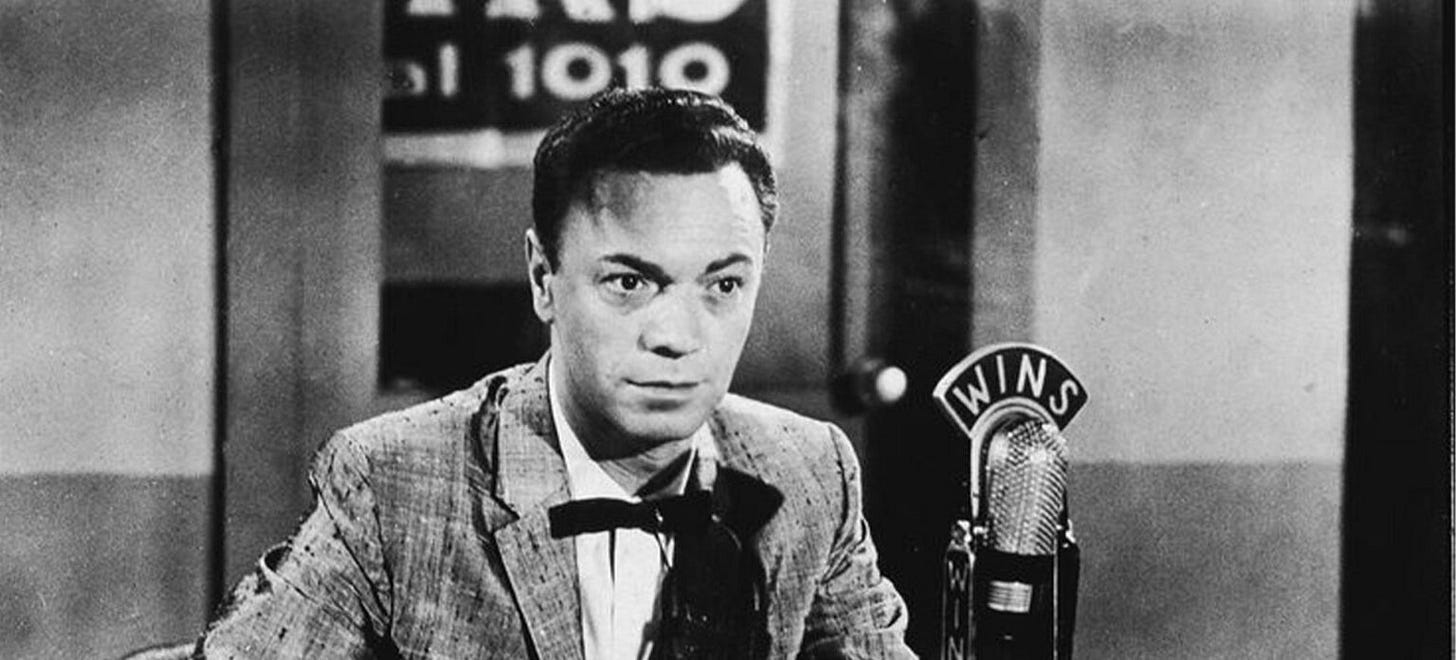
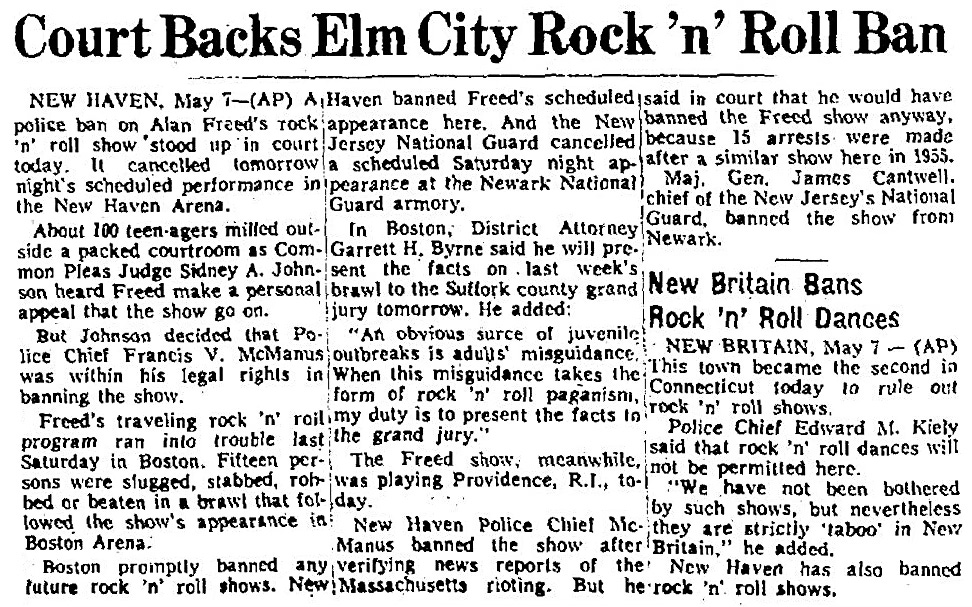
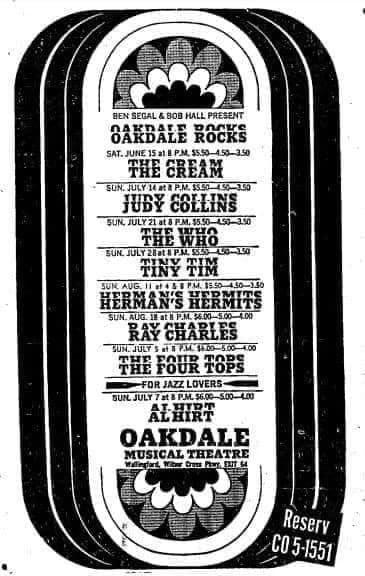
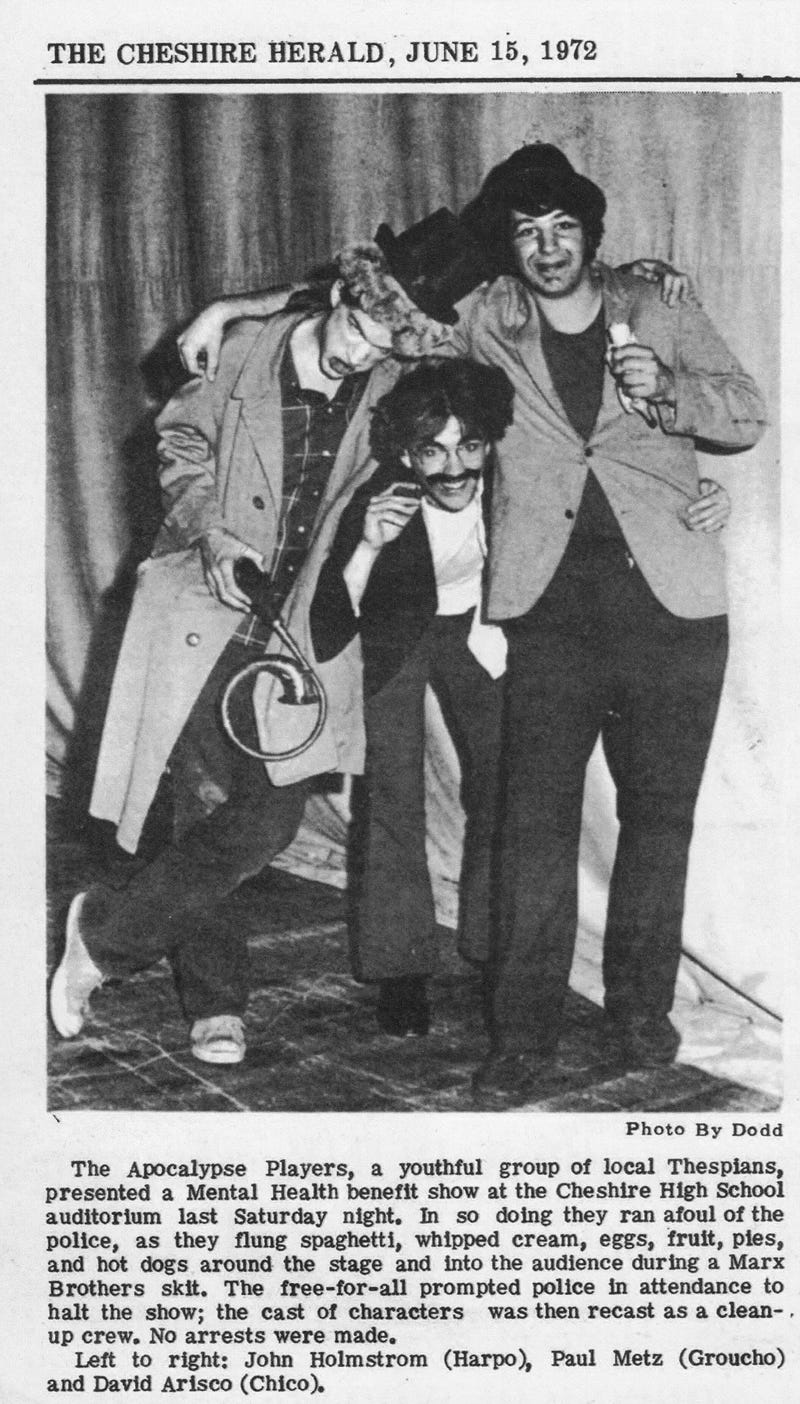
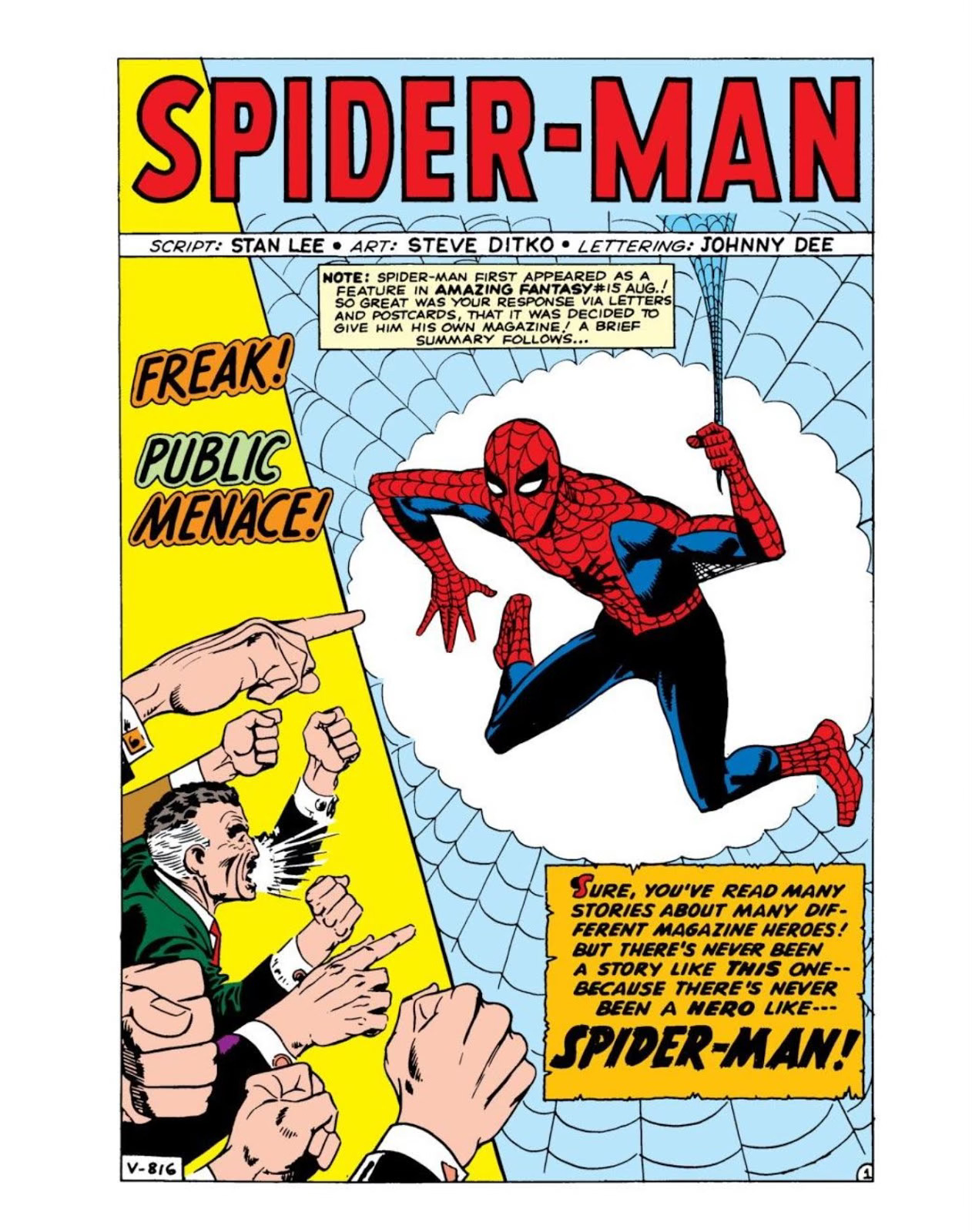

Thanks! Yeah, I 'fell in with a bad crowd," you could say. But who wants to hang out with a bunch of nerds? (Especially back then.
I had a lot of fun back then--whenever I could escape high school!
I would love to d anther "free concert" event, but there are costs involved. Last year's rain out event cost me thousands of dollars. We were expecting hundreds of dollars in table sales but got nothing.
Does GOD hate punk rock? I wonder sometimes.